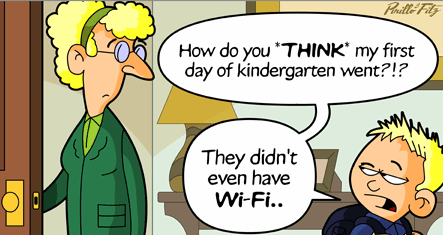though a PhD is certainly preferable
Why? My profs did not have PhDs - they were not necessary to be a good teacher (and still are not)
though a PhD is certainly preferable
Why? My profs did not have PhDs - they were not necessary to be a good teacher (and still are not)
probably receive a teaching award
Actually students are good judges. They tend to award these for good teaching, not for lolz Of course, when you're well taught, you often enjoy it.
old only eighteen copies, a hit rate of about 8 percent.
So what? If I wanted to read it I'd find a free copy online
That proportion was expected to rise.
Old stats. Has it risen?
narcissistic and transparently self-promoting twaddle
Where's the evidence for this judgement?
is a mystery to me
Pfff
direct support
So not no support, then - just no DIRECT support
sessional instructor
How is this relevant?
curiously inflated sense of self.

a Hannah Arendt or an Aleksandr Solzhenitsyn
Snob
A digital lecture is assigned as preparation for a live lecture that will be about a digital lecture.
What is the actual problem here?
one sans PhD
Oh, the horror!
All efforts to create the illusion of academic content are acceptable so long as they are entertaining,
Where's the evidence for this?
the eradication of content from the classroom
If it's Srigley's class, then who is responsible for this change?
that lectures rank well below Twitter, Tumblr, or Snapchat.
You know that saying about any teacher who can be replaced by a recording should be? Well, if you are not engaging students so they are turning to their phones, then who's likely to be to blame for that?
particular matches perfectly
How does it match perfectly? Does this just mean "suits the author?" I suspect so.
mostly bored youth
Why are they bored? Is this a general attitude, or is it specific to Srigley's classes?
half of my humanities students
But this does not say anything about other students, or give reasons why they don't want to be there (I am avoiding making an obvious inference here ...)
I want the educational practice to come first.
But a problem that we have at the moment is that folk are just translating their "traditional" practices online, when they need to transform them.
UK's
Not the UK. Scotland has free HE
so-called

we cannot teach them.

digital natives

digital native

[Google Scholar]
This link does not find anything :(
We strived to make our work as participant-researchers transparent and dialogic by sharing tentative findings and engaging in dialogue about our inquiries into learning in CLMOOC online, as well as offline in conferences with CLMOOC participants in attendance.
Being open about what we are doing as participant researchers is vital - always give opportunities for opt out and remind folk that conversations might be used.
“moderate disguise”
Noting this phrasing for my own proposal
Responding participants either requested to have their online identities remain connected to their professional learning artifacts by affirming the use of their first names, or indicated they would like a pseudonym used.
I think this is important. Creators have a right not to be anonymised in research if they wish
Is critical digital pedagogy a conversation for the privileged?

Is critical pedagogy a conversation for the privileged?

"Is it like free?"

I don't think that "open" is what you scaffold.

spaces
Spaces or places:
"McKee and Porter [52] argue that decisions about working with material shared in online spaces largely depends on whether the Internet is viewed as a “space” or a “place”." Smith et al 2016
lord of the dance

set up a roadblock

“a disgusting guy,”

Donald J. Trump’s
haecceities
read
Hmmmm
sarcastic
Sarky is my middle name :P 
Lisa utilized Hypothesis’ page commenting function
I'd suggest using Vialogues for this as well
The cat is wrapped in itself.

better

cow comics

wizards

branding

transferring

livestock husbandry.
Or a sausage factory 
sit on a stump

3 am

granules of rain

time out of mind
Apparently that's a film.
3 am on time change day

using the rhizome as a conceptual frameworkfor teaching and learning in a MOOC.
Was the rhizome used as a conceptual framework, or was it a metaphor? (joke!)
metaphor’s
NOT a metaphor
rhizome metapho
Not a metaphor
metaphor
Not a metaphor
botanical definition.”
This cannot be emphasised enough
metaphor
IT IS NOT A METAPHOR
Metaphors
Rhizome in D&G is not a metaphor. In Cormier's writings it's a story
rhizome concept
Not a concept
but that knowledge and understanding of Deleuze and Guattari’s conceptual principles of the rhizome was more difficult.
Was this even an aim of rhizo14?
This finding confirmed the excitement and motivation that an experimental pedagogy can generate,but alsorevealed more negative outcomes experienced by someparticipan
Isn't this just true of all pedagogies?
C wasinformed byDeleuze and Guattari’s (1980/2013) concept of the rhizome.
No it wasn't
Rhizo14 was designedas a connectivist MOOC (known as a cMOOC)
Is it an rMOOC?
Adult learning
Yup. Lide long learning. #CLMooc, #DigiWriMo, #Rhizo14, 15 ,16 #DS106
The Arboreal University strangles rhizomes
YES! It striates. Don't be fooled and think that you can fight this from within.
Above ground it may look like a forest of many different trees, but it’s actually a single giant sprawling root.
I don't think that botanical metaphors are helpful. This is better imo: "Wasp and orchid, as heterogeneous elements, form a rhizome." ATP page 10
metaphor
Dleuze and Guattari, the inspiration for this, are adamant that rhizome is not a metaphor. They say that it is a concept.
If inclusiveness is something we need to worry about - to what extent
We can (and should?) try as hard as we can,but total inclusiveness is impossible
grooming.
Are you grooming us? :P
rhizo14
Yup, darn right. It was rhizo14 for me
National Student Survey
SMART targets
Nothing smart about SMART targets
omerta
And
I'd like to talk more about the difference between open and public 
y.
I wanted to annotate Robin's tweet and echo that I love the way that Hypothes.is is developing based on user suggestions - but I can't (yet) annotate tweets embedded into a blog post.
anticipate this
Yes, this is a tricky one. You're right, it needs thought.
hides conversations
Notice how our conversations are fractured - they are on the blog, in the margins, on Twitter, G+, Facebook, other blogs. Not all of us are in all of those places yet there is nothing elite about any of them. This is interesting.
elitist
I don't think it's elitist any more than accessing the internet is, as Hypothes.is is free for anyone to use. It does require (at the moment) that one is "in the know" but that's not quite the same, imo
imaginary hammer, I’d ring it in the imaginary morning
“this is not metaphor”
Saying something is a metaphor is saying that one thing is a bit like another thing. D&G are not saying that. They are saying that the rhizome is a concept - a thing. The orchid and the wasp are not a bit like a rhizome, together they become a rhizome.
Simon
I prefer a brick: "A concept is a brick. It can be used to build the courthouse of reason. Or it can be thrown through the window." Massumi on D&G p xii of ATP: http://projectlamar.com/media/A-Thousand-Plateaus.pdf 
s invitation
And thinking: In memorium
Sarah
How to philosophise with a hammer: http://www.amazon.co.uk/Twilight-Idols-Oxford-Worlds-Classics/dp/019955496X 
Simon sez he would prefer not to annotate
He did a lot of annotating though ;)
t-shirt
I bought a Tshirt!https://twitter.com/NomadWarMachine/status/708014826883325953
I wish there was a way to embed tweets here
SnagIt
I love the way it flows in Snagit 
Vialogue
Having got used to the rich media I can post with Hypothes.is I found Vialogues commenting limiting 
war
Hippy troll 
Let us choose love rather than war.

Trees and rhizomes are not in opposition they are interdependent.
https://www.youtube.com/watch?x-yt-ts=1422327029&x-yt-cl=84838260&v=-8SORM4dYG8
IT IS NOT A METAPHOR.

I believe strongly that philosophy has nothing to do with specialists
where does he say this? I wanna see who he was having a go at.
Love
rMOOC
That's what some of us have called it in a piece we have accepted for publication
troll

"Rhizomatic Learning the Community is the Curriculum."
STORY.
"In personal communication, Dave said, 'D&G hate the word metaphor… I have certain feeling[s] about how the word translates into English. It's the reason I now use the word story.'" Here
Perhaps he was one of the patients - that would explain everything.
Could be - wasn't this a non-hierarchical place where everybody took turns in being cook, nurse etc.?
But it mostly play.
Play is important
We’re working on a way to let you easily download all your annotations.
Yippee!
All students are different, and, I think, do better in the end when they are free to choose their own paths
Bot how do you force them to be free? (cf Rousseau)
Collaboration in
You want Jigsaw learning for this.
I don’t think it makes sense to talk about technologies until everyone has a passing comfort with them.
Pfff. If Terry/Kevin are comfortable and I am not (yet) I'm happy to talk about them.
cheating and sharing
No. Because cheating implies something covert, whereas collab learning acknowledges that sharing is going on (and that often it's not poss to say who owns or invented an idea)
The learning contract is meant to broaden the possibilities.
You can still have a learning contract based on static resources, though
addresses the power structure of a course.
How? By making it explicit, or changing the balance?
This is the most rhizomatic end of the continuum. From here students are not only engaging with the content, making knowledge with it in their own way, they are starting to make connections with that content. Learning how to use it with their peers, to build and make stuff with it, is an important step towards internalizing a context. To being able to work within a context… to learning.
How is this different than connectivism?
Some people might disagree with me on this one,
Who? Surely this is the basis of constructivism?
just an excuse,
It's a bit more than that, surely? It sets the tone as well
refers to a responsibility on the student’s part for the creation of things they are going to learn.
But you can have this with behaviourist models as well. It might be necessary, but it's not sufficient as a definition?
personal reflection
Bacon has a triad of read, write, discuss
These are the points where your investment in building a community really come to help.
How can they do that? Hashtags?
ng to fail on you
Networks will go down
In some sense it’s almost the same response.
So how do you manage that?
reflection,
I'd add Vialogues and Hypothes.is for this
Do things that are hard… and come tell us all about it.
But not just because they are hard, because they are also appropriate
It sets the ground rules of the language we are using.
Overt teaching
Detail your learning journey I’m going to learn WAY more from the ways that you have learned than from the final product of that learning. What wrong turns did you make? What were the important lessons that allowed you to move forward? What good ideas did you have that you didn’t have time to follow up?
Yes. Celebrating failure is also important
Good feedback creates new connections
Good feedback shows the learner how they can change
new understanding, or to get a sense of a new context
Or they are old friends joining together to play, or to be more than the sum of their parts. Need not be anything new about this.
Responsibility vs. Obligation
Obligation is what I should do. Responsibility is something I should take (an attitude towards)
sometimes you need to remember
No - sometimes I just will be the person who remembers. I don't need to carry memories around in case someone else needs them. (I used to often be the person who had a light as I smoked. One I stopped I was not that person any more.)
ith Evernote
Also Pocket
mendeley.com
I use Zotero in Firefox
f the links
Use Hypothes.is as well
keeping track of digital stuff
Blockchain
Trololol
… but ideally those objectives would lean more on the learner’s side than the teacher’s.
Can you scaffold learners collaboratively setting objectives?
It seems like a vital transition between passive textbook learning and active internety learning.
But internet learning can still be just as passive.
Addressing this feeling of loneliness as a natural part of the process and something that a person can do something about with focused effort might be just the thing that some students need.
How would this be addressed?
whether you are embodied or not.
Yes. Being "othered" can happen whether in the flesh or online.
none of these barriers here
I think we do. One problem is that we don't know what will offend others, what they assume should be going on. The danger is we broadcast our western ideals out and do not notice that our community is not "really" diverse.
is
typo?
learn the same thing
Are you sure?
The technology of writing allows for words to be hardened, or recalled. We have an established canon to be learned.
I always think of Pheadrus here
Then, it meant you could recite the whole poem from memory. Now, it generally means you know what the title refers to, and may know the gist of the story. The the act of knowing (and by extension, the act of learning) is impacted by the technology available at a given time. How would The Odyssey have been taught 2500 years ago or a 1000? A hundred? How can we teach it now?
More importantly: his is it learnt nowadays
how the technologies that underpin our ideas
How do technologies underpin [my] ideas?. Do they?
’21st century literacies’
What are these?
whereas after the printing press it necessarily would.
Surely not. So the blind can't be knowers? Some used to look down on dyslexics for not being clever enough to raad, but I hope we're beyond that now.
t it’s tough to say it’s important in the same way.
Depends what you're taking about. I can do mental arithmetic more quickly than any machine, and that memory is not challenged by the internet.
how much work you’re doing… How much
Why is quantity (and not quality) desirable?
that making meaning, creating knowledge, is something that happens in public.
Always? Only?
Every situation is different.
But some are similar
‘best practices
Pfff to best practices. Good practice will do for me.
‘getting the job done’
How is this not learning?
collaborate
Collaborative?
best practices?
Are there good practices? Are there bad ones?
Organizing access to hundreds or thousands of people who are thinking a certain thing, s
For a long time there were not hundreds or thousands of folk, but an educated elite.
e general agreements about how you might think about something?
Are there strong disagreements? (i.e. are there difference schools of thought). Which prevails and why?
way at it
So are we 
‘cargocultery’
I'd heard of this before you tweeted the article, but not really understood what it was: Cargo cult (or thought about how it is a post hoc ergo proctor hoc fallacy)

y
I want to be able to comment on the gif of the bird and say how beautifully it reminds me that learners can be fragile, and that trust is important.
networks
supports help you to annotate in open?
Being able to extract it in a reusable format is what I need.
cons
I think there is the possibility that the annotations will get messy as more than one cohort tried to annotate the same page. There will be good and bad things about this, of course, and using a group to share to can keep the comments confined, but this won't be to everyone's taste
What are your experiences w open annotation in teaching, learning?
I use it to play lie this as I chat with friends, and I am also using it (alongside Zotero) to build up a body of annotations for my own research topics.
time zone differences

Me at 8pm EST
The rhizome itself assumes very diverse forms, from ramified surface extension in all directions to concretion into bulbs and tubers.
Quote
A system of this kind could be called a rhizome. A rhi-zome as subterranean stem is absolutely different from roots and radicles. Bulbs and tubers are rhizomes. Plants with roots or radicles may be rhizomorphic in other respects altogether: the question is whether plant life in its specificity is not entirely rhizomatic. Even some animals are, in their pack form. Rats are rhizomes.
Definition of a rhizome
As for the war machine in itself, it seems to be irreduc-ible to the State apparatus, to be outside its sovereignty and prior to its law: it comes from elsewhere.
Food for thought
Share this:

ensuing discussion
I guess that if you wanted to ease folk in, you might start with sharing annotations to a group, rather than being totally public?
I think not
I'll give a counter argument to this. How about seeing Hypothes.is and Zotero as tools for writing an annotated bibliography?
“crowdsourced” rubric
Should we crowdsource a rubric? How would you assess this? 
How frequently should readers annotate a course text
How often should they (we) read it? Should they (we) begin annotating straight away, or should they (we) read first then annotate later?
Some learners were initially concerned about publicly identifying with their open annotation,
It's a shame that there is not the option to change one's user name.
annotation tips for students.
I didn't know about these - they look really helpful
share.
Zotero and Hypothes.is are changing my, and my students' lives.
will
Is this an impossibility? Could there be schools that taught this? Or is this just the case for ideological reasons? (E.g. it's against the interest of a neo-liberal state?)
https://hypothes.is/stream.rss?text=@tellio
Nice. Added that to Inoreader with my handle :) (Now I have to remember to look at inoreader, haha)
include:
And now you have us wanting to export to storify - or is that included in these?
“JOMO”
I love this. Every time I get to not go to a meeting at work, this is me 
nomadwarmachine
Well, I dunno about smart.
Kelly Hicks
This is a 404 for me
including graduate education, online learning, and asynchronous text-based discussion.
Are these never designed for play? Again, I think that this is too strong a statement - not traditionally designed for play? Not typically?
By contrast, things like #rhizo #clmooc etc are explicitly designed for play imo
“Playfulness assumes one of the core attributes of play: appropriation. To be playful is to appropriate a context that is not created or intended for play”
This strikes me as an odd definition. I don't think I agree with it. Chambers agrees wih me:
playful adj 1 full of fun; frisky. 2 said of a remark, etc: humorous. playfully adverb. playfulness noun.
students
I think learners would be a better word here.
I suggested they try to reconstruct the poem, sort of like a puzzle (which is difficult with no context, I know … that is part of the whole endeavor)
I just did that
ation again. I like messy
Interesting. New annotations are going to the top of this, not to the position in the original annotations at th side of the post.
And we have to stop blaming teachers for all of the ills and injustices of American society.
Are they really blamed for everything at the moment?
In the real world, however, highly unionized areas of the country, such as the Northeast, produce students with scores higher than the national average in standardized tests; the Deep South, where union teachers are more scarce, produces scores that are lower.
Correlation or cause?
The real problem is persistent poverty.
Yes
we are failing to produce an effective workforce;
I loather the neo-liberal reduction of education to training for the capitalist machine. What about producing good citizens? Well rounded humans? Happy people?
Everyone celebrates his or her personal memory of individual teachers, yet, as a culture, we snap at the run-down heels of the profession.
Isn't this always the way though with generalisations?
a problem I hadlived but not labeled, so to speak.
Beautiful
longitude and latitude,
I think these are Spinoza's terms
‘there’s nothing to explain, nothing to understand, nothing to interpret’
YES! Stop looking for meaning!
‘Philosophy’s like a novel: you have to ask “What’s going tohappen?,” “What’s happened?
Well, continental philosophy certainly. Analytic?
‘built upon the not-so-controversial ideathat how we conceive the world is relevant to how we live in it.’
cf Wittgenstein
is reading with love.
Exactly
So you will never get to the bottom of a concept like multiplicity, you will never beable to figure out what it really means, nor, if you become the least bit Deleuzian,will you want to
There is no such as thing as what it really means"
a narrative space it is also my map.
Does it show where you are going as well as where you have been?
I am just getting used to Hypothes.is having played with Diigo but am yet to really master it.
I find it a lot easier than Diijo
s useful as an instruction manual for a derelict ship's engine.
Less useful, perhaps - as the instruction manual might give hints on how to build a new engine, or mend a similar one.
Gordian rhizome

Otto Scharmer and Peter Senge
“choose your own adventure game”
